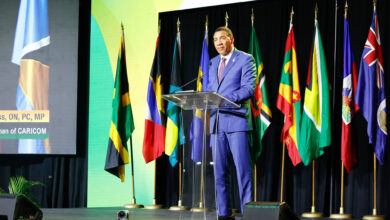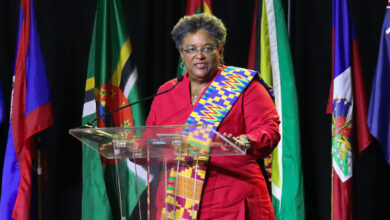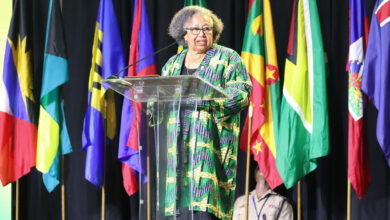NEW GLOBAL REALITIES DEMAND NEW CARICOM TRADE POLICY GROS-ISLET, SAINT LUCIA – While Caribbean Community (CARICOM) Countries are committed to and are active participants in international trade negotiations, some uncertainty has emerged amongst Member States concerning the benefits to be derived and costs entailed. There is also mounting concern over the scope and pace of the adjustment process, which would result from the conclusion of any or all of these negotiations. These were the sentiments of Jamaican Prime Minister Most Hon. P.J. Patterson, who delivered the lead presentation on the status of external trade negotiations in which the Region is involved, on this the first day of the Twenty-Sixth Regular Meeting of the Conference of Heads of Government of CARICOM – set to come to a close Wednesday, July 6. Prime Minister Patterson, who Chairs the Prime Ministerial Sub-Committee on External Economic Negotiations, emphasized that the erosion of trade preferences, in key commodities like bananas and sugar for example, has been a catalyst of this apprehension, as has tardy progress on special and differential treatment for small, vulnerable developing economies in the World Trade Organization (WTO) Doha Round and the general push towards reciprocity in trade relations. Recently unveiled plans by the European Commission June 22 for an overhaul of the Common Market Organisation for sugar, which propose to cut guaranteed prices totalling 39 percent in the price of white sugar over a period of four years (which – if adopted – would seriously impair the functioning of the Sugar Protocol between Africa, Caribbean and Pacific (ACP) Countries and the European Union (EU)), is one example of weakening global support for preferential trade mechanisms – long enjoyed by Caribbean economies. “There is a lack of empathy for the challenges facing small, vulnerable developing economies, with relatively high per capita incomes. Only the destitute gain attention, and even this is at the behest of civil society activists. Current geo-politics are such that the Region is no longer a priority for any major power,” Prime Minister Patterson said. Apprehension is increasing particularly as governments contemplate their ability to finance export diversification, concurrent with fiscal fallout from reduced tariffs. Development financing needs are escalating at a time when development assistance to the Region is suffering a steady decline. There has been a discernable shift of aid resources away from the Caribbean, and into those African countries where poverty is high and increasing. Allied to this, there has been pronounced diversion of resources traditionally earmarked for development purposes to security driven objectives, notably Iraq. There appears to be a global move towards a purely market-driven approach to economic policy, the ideological tenets for which are spilling-over into trade policy. The philosophical shift to free trade instead of development assistance in the form of aid and preferential trade arrangements is manifested in the approach taken by developed countries in all the arenas of negotiation in which the Region is engaged. Prime Minister Patterson lamented that in the post-Cold War era, where fundamentalist free market/free trade economics is pandemic, middle-income countries have been graduated without notice or formal announcement. “All of this is unfolding against the background of rampaging globalization, that is dismantling national barriers to international transactions, obliterating the meaning of sovereignty, foreclosing development options and disparaging the diversity of cultures and national societies,” he said. A global market economy must be embedded in a multilateral framework that limits the instability which is periodic in unregulated markets, and the excesses of the market must be compensated for by resource transfers and special opportunity enhancing programmes for the vulnerable. This was the approach taken in the post-War era of unprecedented growth. It is critically important that the approach be replicated at the global level, by an interlocking network of multilateral regulatory and developmental institutions. Anything less will make a mockery of the United Nations Millennium Development Goals. Director General of the Caribbean Regional Negotiating Machinery (RNM) Ambassador Dr. Richard Bernal underscored Prime Minister Patterson’s sentiments, noting that as recently as the mid-1990s the world was a more hospitable environment in respect of preferential trade arrangements and for the development of small, vulnerable developing economies, such as those of the Caribbean. With trade liberalization, preferential access granted to developing countries has declined in value. In recent years, there has been an erosion of trade preferences, most graphically illustrated by changes in the EU banana regime; the effects of which have resonated most acutely with Caribbean Windward Island small-holder banana farmers. The economies of the Windward Islands are highly dependent on bananas for export earnings, under preferential access to the European market. In addition to sustaining many of the Region’s economies, preferential access to European markets safeguards the livelihoods of thousands of families in the Caribbean. “Rather than pressing for the abandonment of preferences, rich nations should be examining ways of maintaining them as long as possible, and identifying tangible compensatory measures to ameliorate the effects of preference erosion,” Dr. Bernal said. He suggested further, that in the case of small, vulnerable developing economies, “their share of global trade is so negligible that preferences cannot possibly be seen as disruptive or somehow an impediment to free trade, in a way that harms global welfare gains.” Amongst its objectives in WTO Doha Round talks, the Caribbean is seeking adequate provisions for preferences. The Region has long drawn the attention of the WTO to the importance of trade preferences for the development of its respective agricultural sectors (in particular bananas and sugar) and to its overall development needs, maintaining that the erosion of preferences would have economy-wide deleterious effects. Export revenue loss from preference erosion is likely to arise, as trade preferences improve market access for small, vulnerable developing economies, but also engender export diversification and in the longer term provide impetus for export-driven economic development. Trade preferences have emerged as a central issue in the WTO Doha Round agenda. Indeed, the importance of preferences are acknowledged in a key WTO accord, brokered last year. Emerging from the WTO General Council held on July 28 to 31, 2004, a framework consensus was reached in the General Council Decision of August 1, 2004 (WT/L/579) which recognizes the negative impact of preference erosion, and has committed Members to craft rules that fully take this issue into account. “As regards a way forward, in recognition of the new realities our Region faces, the formulation and execution of a strategy of external negotiations must be pursued based on a more unified, focused regional external trade policy. This in turn must rest on a foundation of and be a logical expression of a coherent regional development strategy. There is little time to undertake this task as the goals, scope and pace of the global process of trade liberalization are driven by the very logic of globalization,” Dr. Bernal emphasized. Reacting to Prime Minister Patterson’s presentation, Heads of Government noted the sobering analysis it advanced – and acknowledged that without geo-political importance or economic significance to demand concessions, it is incumbent upon the Region to rethink its strategic alliances and hone its negotiation strategy and tactics to the new reality. Background The Context in which External Negotiations are being Conducted by CARICOM The Caribbean region is simultaneously engaged in three major negotiations, namely: the WTO Doha Round – progress for which continues to be slow, on the eve of “first approximations” set for the end of this month; an Economic Partnership Agreement (EPA) between CARIFORUM and the EC, which is progressing well towards the conclusion of the second phase of negotiations; the Free Trade Area of the Americas (FTAA), which has been stalled for 19 months; in addition, CARICOM is prepared to launch negotiations with Canada in pursuit of an ‘enhanced trading arrangement’ – further, CARICOM is exploring the possibility of a bilateral trade arrangement with MERCOSUR.
News Letter
Subscribe to our mailing list to get the new updates!
Related

Keynote Address | Dr the Most Honourable Andrew Holness, ON, PC, MP | Prime Minister of Jamaica | Chairman of CARICOM | 49th Regular Meeting of the Conference of CARICOM Heads of Government| 6 July 2025
July 8, 2025
Check Also
Close



